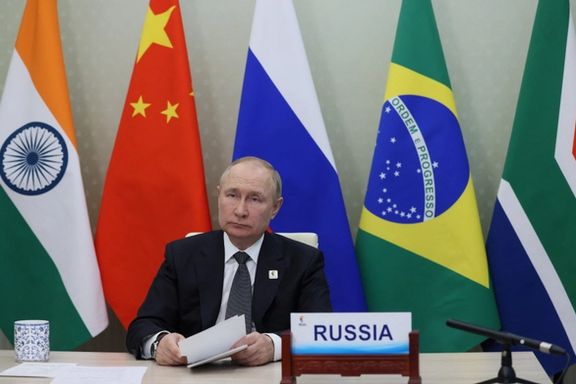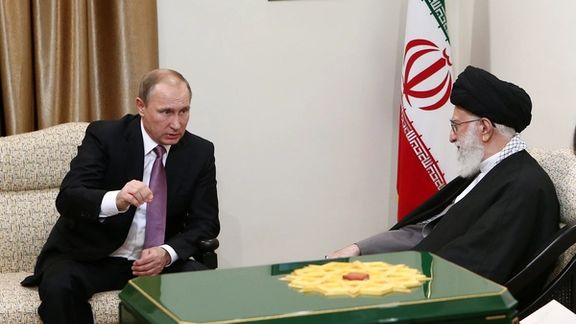As Putin Arrives In Tehran, Hardliners See It As An Anti-West Move

Russia's Vladimir Putin arrives in Iran on Tuesday, in a visit much anticipated by the hardliner government in Tehran and hailed as a major anti-West event.

Russia's Vladimir Putin arrives in Iran on Tuesday, in a visit much anticipated by the hardliner government in Tehran and hailed as a major anti-West event.
The formal reason for Putin’s visit is a tripartite summit with his Iranian and Turkish counterparts to discusses Syria, where Tehran and Moscow back Bashar al Assad and Turkey backs the residual rebel forces in the north of the country.
Turkey's President Rcep Tayyip Erdogan also arrive in Tehran and received by President Ebrahim Raisi.
However, Iranian government-owned media has been portraying the visit as a major event to counter the West. Fars news website affiliated with the Revolutionary Guard on Tuesday splashed a headline decaling, “The end of Western monetary and financial hegemony”.
Presumably, Iran and Russia are setting up a mechanism to interchange currencies, but the outline is so vague it is impossible to clearly describe it.
Last week, the US National Security Adviser Jake Sullivan twice warned that Iran might provide military drones to Russia to be used in the Ukraine war. Iran’s foreign ministry tried to deny it, saying Tehran is neutral in the war and will not aid any side.
US State Department spokesperson Ned Price on Monday [July 18] reiterated that Washington is monitoring the situation. “Well, we’ve spoken about our concerns regarding a potential Iranian provision of UAV technology to Russia. We will continue to watch very closely. All of our sanctions remain in force,” he said, adding that such a transaction might violate of host of American and other sanctions on the two countries.

Despite their political alliance, which since the invasion of Ukraine has increasingly taken an anti-Western tone, economic transactions between Iran and Russia remain small.
Bilateral trade rose to $4 billion in 2021, but this is far less than, for example, Russia’s trade with Turkey at $33 billion, while Moscow’s exports to Iran are mainly foodstuffs, which are less vulnerable to US third-party sanctions than other sectors.
Before its costly adventure in Ukraine, Russia was mindful of US third-party sanctions on Iran and there were no major cases of, for example, banking violations.
The specter of an emerging US-backed Arab-Israeli bloc that could tilt the Middle East balance of power further away from Iran has accelerated its clerical rulers' efforts to strengthen strategic ties with the Kremlin.
"Considering the evolving geopolitical ties after the Ukraine war, the establishment tries to secure Moscow's support in Tehran's confrontation with Washington and its regional allies," Reuters quoted an unnamed senior Iranian official as saying.
Sending a clear message to the West that Russia will seek to boost ties with anti-West Iran, Putin will meet the Islamic Republic's most powerful authority, Supreme Leader Ayatollah Ali Khamenei, just a few days after US President Joe Biden visited Israel and Saudi Arabia.
Emboldened by high oil prices after the Ukraine war, Tehran is betting that with Russia's support it could pressure Washington to offer concessions for revival of a 2015 nuclear deal.
Almost a year of indirect talks between Tehran and Washington in Vienna stalled in March, with Iran questioning the US resolve and Washington calling on Tehran to drop extra demands.
But Moscow and Tehran, both subject to US sanctions, have overlapped interests. Iran, whose oil industry has struggled for years under US sanctions, has long relied on exports to China to keep the economy afloat. Since the start of Ukraine war, Moscow has taken away a big chunk of Iran's oil market in Asia.
In May, several reports said that Iran's crude exports to China have fallen sharply as Beijing favoured heavily discounted Russian barrels, leaving almost 40 million barrels of Iranian oil stored on tankers at sea in Asia and seeking buyers.